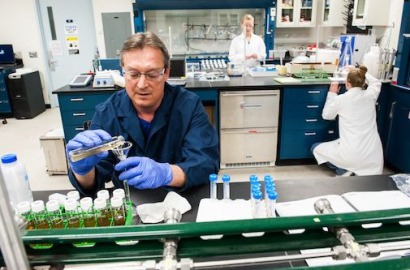
Today, however, the most promising replacement to the fossil-based society is taking a European leap forward. Alongside industry representatives, European Commission President Barroso and Commissioner for Research, Innovation and Science Geoghegan-Quinn announce in Brussels the formal launch of a €3.7 billion Public-Private Partnership (PPP) on biobased industries.
Immediately, substantial investments in biobased products and fuels sourced locally and "Made in Europe" will be initiated using the continent’s untapped biomass and wastes as feedstock to make fossil-free and greener everyday products. All while creating jobs, sparking rural growth, and reducing greenhouse gas emissions.
“Europe is not ahead of the curve when it comes to realizing the immense potential around the creation of the biobased economy – the only viable alternative to our current oil-based society,” said Peder Holk Nielsen, President and CEO of Novozymes, who is representing the emerging industry on the ground in Brussels today.
“With this unprecedented public-private commitment, however, we demonstrate the EU wants to take the lead in this transition towards a biobased economy. For Europeans, it is an opportunity to secure thousands of rural jobs and sustainable growth in our regions, while reversing the investment trends currently going to other parts of the world,” Holk Nielsen continued.
A leap forward on the biobased economy
Between 2014 and 2024, the €3.7 billion will be injected into the European economy to develop an emerging sector of the bioeconomy, biobased industries. In 2014 and 2015 alone more than €250 million will come from the European Commission, with the private sector expected to contribute nearly three times as much.
Through financing research and innovation projects, the PPP will create new partnerships between sectors such as agriculture/agrofood, chemicals, energy, pulp and paper, and technology providers.
“Advanced biorefineries and innovative technologies will convert the renewable resources into sustainable bio-based chemicals, materials and fuels. The novelty with this PPP is its focus on bridging the gap from R&D to the market,” Holk Nielsen said. “The large majority of the €3.7 billion will go to first-of-a-kind flagship projects. These are essential to show the technical and commercial viability, at industrial scale, of new generations of biobased products and fuels, and to reduce perceived investment risks for rolling them out.”
A shift from a fossil- and imports-based society
The partnership represents a shift from a fossil- and imports-based society to increase Europe’s share of sustainable economic growth, and is expected to create tens of thousands of jobs, with 80% in rural areas, revitalize industries, and diversify farmers’ incomes.
The initiative will also help combat climate change, as biobased products reduce greenhouse gas emissions by at least 50% in comparison to fossil-based applications – a number as high as 90% in terms of advanced biofuels from agricultural residues and municipal solid waste when compared to oil-based fuels.
More than 70 European companies in the biotech, chemical, energy, agro-food and pulp and paper sectors are part of the initiative.
Photo caption: Jeff Wolfe does research in the compositional analysis lab at the Field Test Laboratory Building (FTLB) at the National Renewable Energy Laboratory in Golden, CO. (Photo by Dennis Schroeder / NREL). Credit: Dennis Schroeder, NREL Photographer
For additional information:

